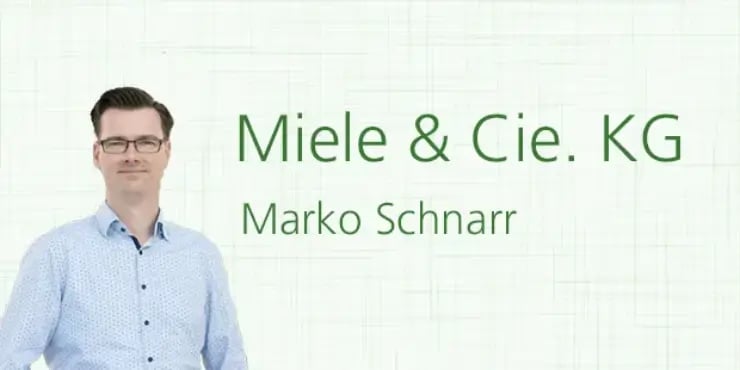Marko Schnarr works for the environmental office at Miele, the well-known manufacturer of household appliances. His goal is to expand the company’s decision-making matrix to fully include environmental aspects. Enjoy the interview!
What do you respond when you are asked by Miele colleagues, for example from the Production department, “why do we conduct life cycle assessments at Miele”?
Our customers expect products from us that are first-class in every aspect. This also applies to our environmental responsibility. But what this means in practice is often not as easy to answer. Saving energy is always a good idea – but there’s a fine line between applying energy saving measures and those measures actually making sense within the context of an LCA. So how should we evaluate individual technology alternatives? Sometimes, it’s obvious and sometimes, it’s not. That’s why we use life cycle assessments for such decisions.
What challenges did you face at the beginning of the LCA activities?
First of all, getting started with Umberto. Fortunately, we were able to base our energy and material flow models on already existing ones from the Institute for Applied Ecology (“Öko-Institut”), which had been compiled in an extensive LCA study. This made the start a lot easier.
Now that you have been dealing with this topic for quite some time already, where do you see the greatest challenges today?
Data collection is always a laborious process. People working in the production and the development departments usually have an entirely different perspective of their day-to-day business. Often they have to “factor out” things first in order to be able to answer my amateurish questions. We usually have a very good knowledge at the macro level but LCAs are frequently micro… and then all the difficult allocation issues soon occur.
Additionally a considerable specialist knowledge on upstream and downstream processes is required e.g. when it comes to metallurgy or recycling. These are the more advanced questions to answer. On the one hand this is what it makes exciting. On the other hand it was the reason why our long-time partner, the Institute for Applied Ecology (“Öko-Institut”) was very relaxed when we announced that we wanted to conduct the LCAs on our own in the future.
How are the LCA results incorporated into the corporate communication?
We conduct LCAs primarily for internal use, so we use the results for the internal communication. For me personally, the most important aspect is that the decision-making matrix is extended to include an environmental dimension.
The big selling points however, such as the 20-year lifetime of the products, are communicated externally. LCAs are difficult to digest for retail, consumers and the media. But when consumers choose the “Miele” brand, they also feel they are making a good choice from an ecological point of view. Therefore an individual evidence, such as an LCA, is not necessarily important.
In 2014, Miele has been awarded “Germany’s Most Sustainable large-scale enterprise”. How would you describe the contribution your LCA activities have made?
Many aspects contributed to this award, as numerous stakeholders in the company are committed to dealing with many different facets of sustainability on a daily basis. A very important aspect is definitely the longevity of our products. This is something that we deliver since the very first beginning of the brand Miele. With an LCA compiled by the Institute for Applied Ecology (“Ökoinstitut”), we have once again been able to prove that this characteristic is also ecologically beneficial. Hence I would say it was perhaps the icing on the cake.
What is the most important advice you would give to other LCA practitioners?
At first I always do my my homework in Excel thoroughly before I even start Umberto for the first time. If you do not work excessively with the “live link” feature, it easily happens that you miss one or the other transition in the model when changing the figures afterwards. I also keep all my handwritten notes with memos and auxiliary allocations so that I can remember my original thoughts even later on in the project.
Thank you Mr. Schnarr!






